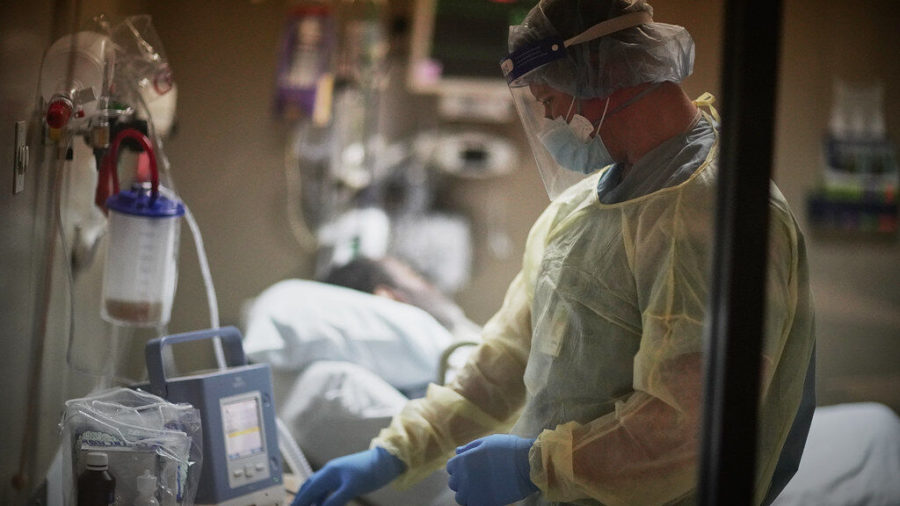- News
- News / Politics And Administration
- News / Politics And Administration / Campus
- News / Politics And Administration / City
Mary Greeley and Thielen prepare for a possible fall semester COVID-19 surge
With students returning to campus for the fall semester and minimal restrictions on bars and restaurants, administrators at Thielen Student Health Center and Mary Greeley Medical Center are preparing for a potential surge in Ames COVID-19 cases.
August 6, 2020
With students returning to campus for the fall semester and minimal restrictions on bars and restaurants, administrators at Thielen Student Health Center and Mary Greeley Medical Center are preparing for a potential surge in Ames COVID-19 cases.
Face coverings are required on Iowa State’s campus, but the city of Ames nor the state of Iowa has instituted a mask mandate. Iowa joins South Dakota as the only two states that do not have a mask mandate.
Over the last few weeks, bars and restaurants in Ames have consistently hosted a steady stream of people without masks.
Health precautions set in place by Iowa State will begin the moment students arrive on campus. Before moving in, students living in university residences will be subject to testing. The tests will be processed by the Veterinary Diagnostic Laboratory and results will be available within 24 hours.
Any students who test positive will either be quarantined in Linden Hall or sent to isolate at home.
Around the country, student health centers at universities that are hosting on-campus classes are preparing for students to return. In an article written by The Washington Post, college health centers were reported as being underfunded and unlicensed by some states.
The Post interviewed many students, including Iowa State student Makenzi Marek, who said she no longer trusts the medical care at Iowa State.
“I absolutely lost my trust,” Marek said in her interview with The Post. “All college students need a safe place to go and make sure that they’re getting the right help [… ] I wish that were the case for me.”
With potentially around 30,000 students returning to campus, case numbers will inevitably grow in Ames. Over the last couple of months, the Ames and Iowa State health communities have been preparing for Ames to become a possible coronavirus hot spot.
In addition to being a testing location for students and staff and developing the Cyclones Care campaign, Thielen Student Health Center has also developed a plan for contact tracing to help limit community spread.
“We know we cannot eliminate all risk of COVID-19, but we have a comprehensive plan to prioritize health and safety while maximizing the on-campus experience,” said Deanna Sargent, Thielen’s communications and marketing director. “We have been and will continue to evaluate several metrics. Obviously, the testing we’re doing on campus, in addition to contact tracing, will be important to help us pinpoint areas of concern for early intervention and limit the spread of COVID-19.”
Sargent said she emphasized the importance of honesty and transparency from those who do have COVID-19 for effective contact tracing.
“Contact tracing is a process used to trace and monitor contacts of people who have been in contact with someone who tested positive for COVID-19,” Sargent said. “Students notified through contact tracing are required to quarantine. These are important strategies to mitigate the effects of COVID-19 on campus and in the Ames community.
“It is absolutely imperative that all students understand the importance of working with the Public Health Team to provide complete and accurate information for contact tracing purposes. This is a critical element of our mitigation strategies that will help limit the spread of infection on campus.”
Sargent said these metrics will help determine what action needs to be taken as it pertains to students on campus, such as class instruction and campus density.
“An effective contact tracing and case management program can ensure that those at risk of having been infected are rapidly identified and triaged to prevent the unnecessary spread of COVID-19 and assists with disease management,” Sargent said.
In a statement provided to the Iowa State Daily, Mary Greeley Medical Center president and CEO Brian Dieter said they began preparing for the impact of COVID-19 in January.
Dieter also highlighted specific safety precautions the hospital is taking to protect patients and staff.
“Mary Greeley has designated specific areas of the hospital where diagnosed or suspected COVID-19 patients are treated, including specific inpatient units, ICU and the Emergency Department,” Dieter said. “Well-established infection control procedures are followed in these areas, and interaction with the COVID-19 patients is limited to essential frontline staff.”
Dieter said staff constantly monitor supply usage to build up inventories and prevent a supply shortage, especially as it pertains to personal protective equipment (PPE).
Questions have also been raised regarding the number of ventilators Mary Greeley has for patients in the event of serious illness from COVID-19. Dieter said in the statement Mary Greeley has 30 ventilators hospital-wide that can be used, and they also have access to ventilators from other organizations if necessary.
Dieter also emphasized the communication within the community to help protect students and residents of Story County.
“Finally, we are in regular communication with community partners, including McFarland Clinic, Story County Emergency Management, Story County Public Health, Ames School District, Iowa State University, City of Ames and clinics and long-term care facilities,” he said.
As students come back to campus over the course of the next few weeks, it remains to be seen what effects will occur from community spread of COVID-19.

















